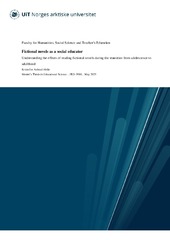| dc.description.abstract | Learning through reading books has been a strategy in our educational systems for as long as education itself has existed, although the focus has primarily been on reading factual books. However, there has not been much focus on reading fictional books, all be it for understandable reasons. On the other hand, reading fictional novels has a potential for learning, socializing, influence and development which is often underestimated.
This study aims to explore various effects of reading fictional novels during the transition from adolescence to adulthood. The study intends to create a better understanding of fictional novels’ role in the lives of enthusiastic readers, explore their potential in terms of influence and benefits, while also explaining these effects from a pedagogical perspective. Although the subject of the effects of reading fiction has been covered quite a bit within other fields, such as psychology, there has been a lack of research done with the perspective of educational science.
The study utilizes semi-structured interviews, looking in retrospect at past stories and experiences of people who had a great interest in reading, particularly during their adolescent years. A total of five participants have been interviewed, all of whom have got their own individual experiences with reading fiction, and their own stories to tell.
The findings from the study show that reading fictional novels holds great potential and can both influence, teach and educate us in numerous different ways, such as an increase in personal growth, enhancing life skills, influencing life choices and improving relationships with friends and family. With such potential, it could be wise to both encourage adolescents to read more, while also potentially promoting reading of fictional novels more in the educational system. Doing so could potentially aid in adolescents’ overall development, which could not only benefit individual readers, but also society as a whole in the long-term. | |


 English
English norsk
norsk
